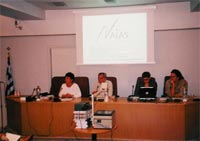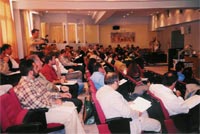|
INNOVATIVE OLIVE MILL WASTE MANAGEMENT SYSTEMS
Workshop on November 1, 2002 in Mytilene
The disposal of Olive Mill Wastewater (and more general
Olive Mill Waste - OMW) is one of the most troublesome
environmental problems for the Mediterranean countries.
OMW is characterised by its high organic load, low biodegradability
and high polyphenol concentration. In an effort to tackle
the problem, numerous research programmes both in Greece
and abroad have applied different biological or physical-chemical
methods both in vitro and in vivo. However, all come
to the conclusion that no-one has come up with a satisfactory
technical solution, at least not in the case of Greece,
where the olive mills are scattered all over the territory
and are mainly small businesses.
The NAIAS -North Aegean Innovative Actions and Support
Programme is financed by the EU Regional Development
Directorate-General and consists of several Actions.
The mission of Action 7.6 is to attempt to bridge the
gap by finding and suggesting effective and viable solutions.
The Waste Management Laboratory (WML), led by Professor
C. P. Halvadakis, an integral part of the Department
of Environmental Studies of the University of the Aegean
has undertaken Action 7.6 and its goal is to select
technically sound, economic sustainable OMW Management
Systems which are socially accepted. Furthermore, these
systems aim to take the specificities of the North Aegean
islands into account. The selected systems of waste
management will be installed on a pilot basis on olive
mills of the North Aegean. The construction costs of
the waste management facilities will be co-financed,
50% of the budget will be met by the NAIAS Programme
and 50% by the local olive mill owners through self-financing.
In the meantime the WML staff will be creating a permanent
Expertise Network on OMW Management issues with a website
serving as a communication and know-how exchange portal.
 In order to inform businesses that may be interested
in participating in NAIAS Action 7.6, the WML organised
a workshop on November 1, 2002 in Mytilene where gave
a presentation of the NAIAS mission (main speaker Dr.
D. Komilis, University of the Aegean). The Workshop
addresses issues related to the existing legal framework
on Lesvos (Mrs. A. Stathelli, Prefecture of Lesvos),
which was followed by a brief presentation of the following
OMW management methods: In order to inform businesses that may be interested
in participating in NAIAS Action 7.6, the WML organised
a workshop on November 1, 2002 in Mytilene where gave
a presentation of the NAIAS mission (main speaker Dr.
D. Komilis, University of the Aegean). The Workshop
addresses issues related to the existing legal framework
on Lesvos (Mrs. A. Stathelli, Prefecture of Lesvos),
which was followed by a brief presentation of the following
OMW management methods:
- Chemical oxidization and anaerobic treatment of
OMW (Associate Professor A. Vlyssidis, Technical University
of Athens)
- Use of the olive mill residue by separation of different
solid fractions using the technique of supercritical
fluid extraction (Professor K. Panayiotou, Aristotle
University of Thessaloniki).
- Recovery of phenolic compounds using membrane technology
(Professor V. Gekas, Technical University of Crete).
- Olive mill waste separation into fractions using
natural sedimentation (Associate Professor D. Georgakakis,
Agricultural University of Athens).
- Combined treatment of municipal waste and olive
mill waste in artificial wetlands (Dr. A. Aggelakis,
National Agricultural Research Foundation of Iraklio).
- Olive grove irrigation using Olive Mill Wastewater
- Waste treatment with hydroponic systems (Dr. K.
Hartzoulakis, National Agricultural Research Foundation
of Chania).
- Olive mill waste terrestrial disposal - Composting
- Fertilizer production (Dr. I. Hatzipavlidis, Agricultural
University of Athens).
- Anaerobic OMW treatment with parallel production
of Fertilizers and energy (Á. Andrian, Aquatec
GmbH, Germany).
 The presentations were followed by open discussions
with olive mill owners of Lesvos and more details regarding
the proposed waste management Systems were provided.
The following conclusions were drawn: The presentations were followed by open discussions
with olive mill owners of Lesvos and more details regarding
the proposed waste management Systems were provided.
The following conclusions were drawn:
- There is no standard solution to the OMW problem.
Each individual olive mill may adopt a different system
of waste treatment and there is rich bibliography
of the numerous approaches with a variety of pros
and cons.
- It is necessary to adopt integrated solutions for
OMW management that take into consideration possibilities
to restructure the production processes (so as to
minimize the volume of waste produced) as well as
the available waste treatment techniques that could
be applied during the various stages of waste production
(light fraction, heavy fraction, oily stage).
- There are two primary approaches to the waste management
issue: the centralized approach (one waste management
facility for a large group of olive mills) and a decentralized
approach (one waste management facility for each individual
olive mill). The former is expected to have a high
investment budget compared to the latter, however
the overall cost per unit waste mass treated is expected
to be lower. In addition, the implementation of the
first approach mentioned requires a supply of waste
from a minimum number of nearby olive mills. In the
case of the decentralised approach, the proposed waste
treatment techniques have a relatively low construction
and operation cost but it requires the availability
of large areas of land.
- A waste management system that appears to be optimal
in the case of individual olive mills is a system
consisting of an initial phased separation tank followed
by an extensive overflow treatment system (treatment
lagoons/ponds, terrestrial disposal etc). The sludge
may undergo biological treatment or be dehydrated
and disposed of at waste disposal sites.
- 23 olive mill owners of Lesvos responded positively
to the invitation to participate in the NAIAS Action
7.6 project, while the Prefecture of Lesvos (Local
Self-government Authority of Lesvos) also reacted
positively regarding its willingness to issue operation
permits to olive mill owners who participate in the
project.
|















